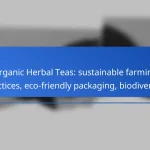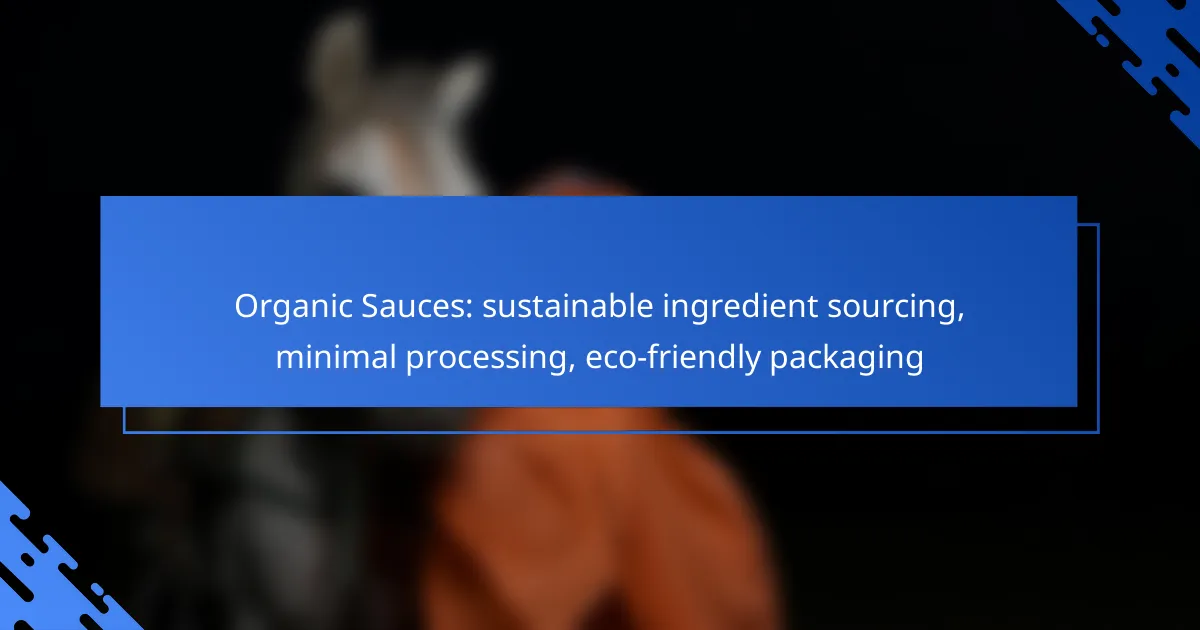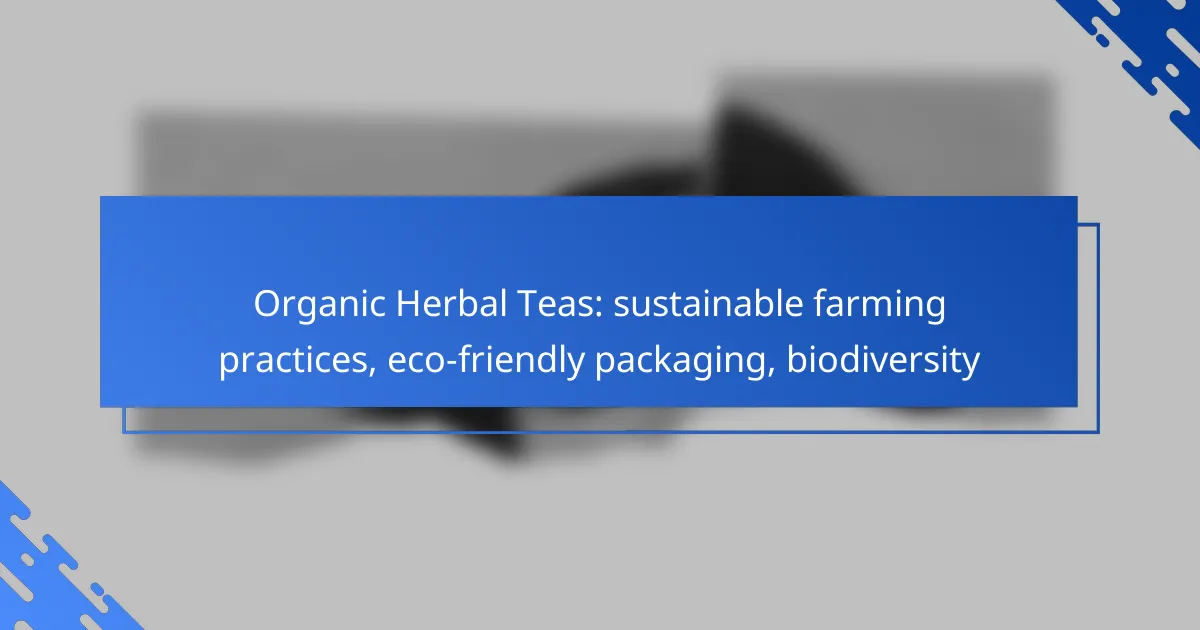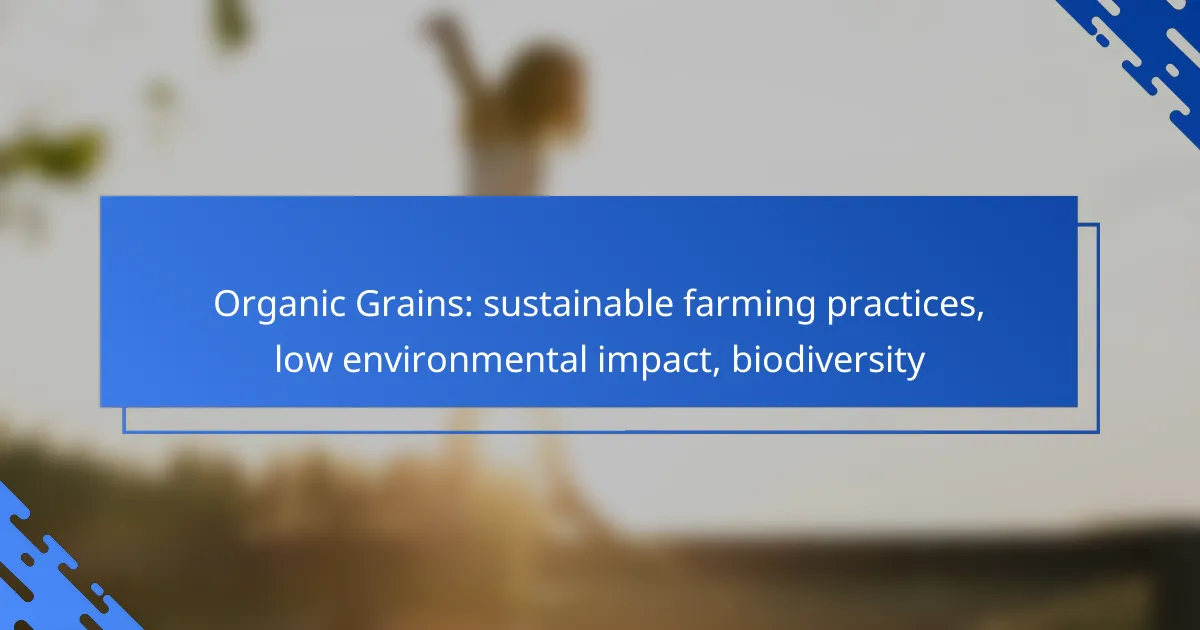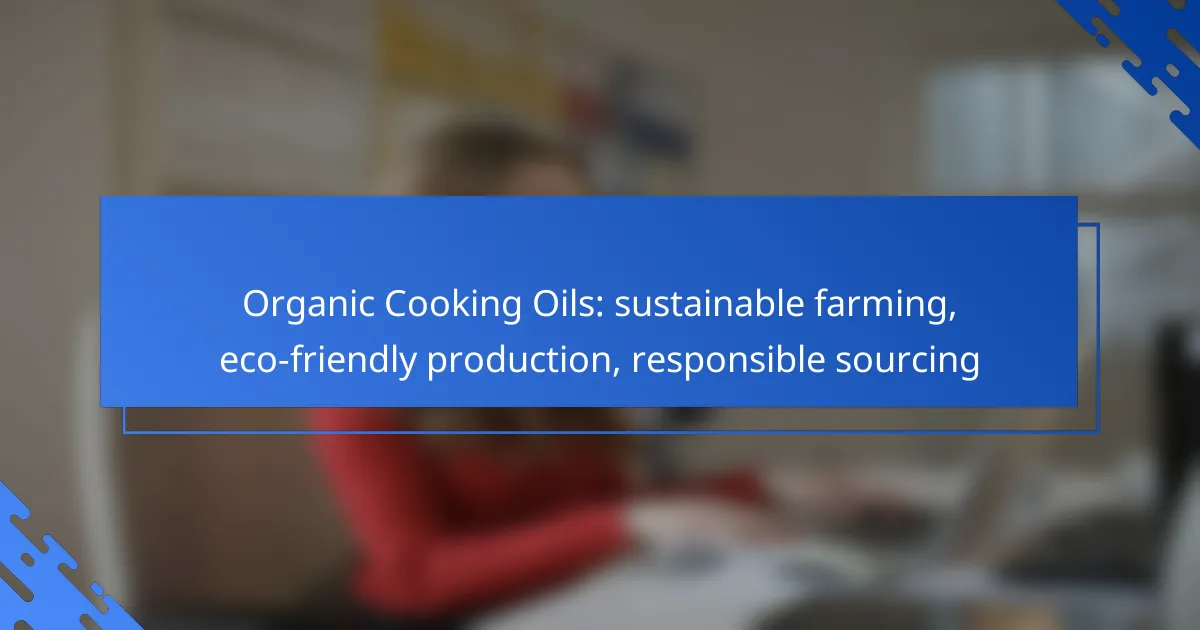Organic sauces represent a commitment to sustainable cooking by using responsibly sourced ingredients and eco-friendly packaging. By prioritizing local and seasonal ingredients, these sauces not only enhance flavor but also support environmental and community health. With minimal processing techniques that preserve the integrity and nutritional value of the ingredients, organic sauces are a delicious choice for the eco-conscious consumer.

What are the best organic sauces for sustainable cooking?
The best organic sauces for sustainable cooking are those made from responsibly sourced ingredients, minimally processed, and packaged in eco-friendly materials. These sauces not only enhance flavor but also align with environmentally conscious practices.
Organic Tomato Sauce
Organic tomato sauce is often made from tomatoes grown without synthetic fertilizers or pesticides, ensuring a healthier product. Look for brands that source their tomatoes from local farms, which reduces transportation emissions and supports community agriculture.
When selecting organic tomato sauce, check for minimal processing. Ideally, it should contain few ingredients, such as tomatoes, olive oil, and herbs, without artificial preservatives. This keeps the sauce flavorful and nutritious.
Organic Pesto
Organic pesto typically features fresh basil, garlic, pine nuts, and olive oil, all sourced from organic farms. This sauce is a great choice for adding depth to dishes while maintaining sustainable practices.
Choose pesto that uses seasonal ingredients to minimize environmental impact. Brands that offer glass or recyclable packaging further enhance sustainability, making it easier to reduce waste.
Organic Barbecue Sauce
Organic barbecue sauce can be a flavorful addition to grilled dishes, made from organic tomatoes, vinegar, and spices. Look for options that avoid high-fructose corn syrup and artificial flavors, which are common in conventional sauces.
When selecting organic barbecue sauce, consider those packaged in eco-friendly containers. This not only supports sustainability but also often indicates a commitment to quality ingredients.
Organic Soy Sauce
Organic soy sauce is crafted from non-GMO soybeans and often brewed using traditional methods, which can enhance flavor complexity. Brands that adhere to organic standards ensure that no harmful chemicals are used during production.
For a sustainable choice, look for soy sauces that are packaged in glass bottles rather than plastic. This helps reduce plastic waste and often indicates a higher quality product.
Organic Hot Sauce
Organic hot sauce is made from organically grown peppers and other natural ingredients, providing heat without artificial additives. These sauces can vary widely in heat levels, so choose one that suits your taste preferences.
When purchasing organic hot sauce, check for brands that prioritize local sourcing and sustainable farming practices. This not only supports local economies but also reduces the carbon footprint associated with transportation.

How are organic sauces sourced sustainably?
Organic sauces are sourced sustainably by prioritizing local ingredients, seasonal harvesting, and fair trade practices. This approach not only supports the environment but also strengthens community relationships and ensures high-quality products.
Local farm partnerships
Local farm partnerships are essential for sustainable sourcing of organic sauces. By collaborating with nearby farms, producers can reduce transportation emissions and ensure fresher ingredients. These partnerships often involve direct relationships with farmers, fostering transparency and trust.
When selecting local suppliers, look for farms that practice organic farming methods and are certified by recognized organizations. This certification guarantees that the ingredients meet specific environmental and health standards.
Seasonal ingredient sourcing
Seasonal ingredient sourcing plays a crucial role in the sustainability of organic sauces. Utilizing ingredients that are in season minimizes the need for artificial growth aids and reduces the carbon footprint associated with out-of-season farming practices. This not only enhances flavor but also supports local ecosystems.
To effectively implement seasonal sourcing, producers can create a calendar of available ingredients based on local harvest times. This practice encourages creativity in recipe development and helps consumers enjoy the freshest flavors throughout the year.
Fair trade practices
Fair trade practices ensure that farmers receive fair compensation for their work, promoting ethical sourcing of organic sauce ingredients. By adhering to fair trade standards, producers can contribute to better living conditions for farmers and their communities, which is vital for long-term sustainability.
When choosing organic sauces, look for certifications such as Fair Trade Certified or similar labels. These certifications indicate that the product meets rigorous social, economic, and environmental standards, ensuring that all parties in the supply chain benefit fairly.

What processing methods are used for organic sauces?
Organic sauces typically utilize processing methods that prioritize ingredient integrity and flavor preservation. These methods include cold-pressed techniques, minimal heat processing, and natural preservation methods, all aimed at maintaining the quality and nutritional value of the ingredients.
Cold-pressed techniques
Cold-pressed techniques involve extracting flavors and nutrients from ingredients without applying heat. This method helps retain the natural taste and health benefits of the raw materials, making it ideal for sauces that rely on fresh herbs and vegetables.
Common examples include cold-pressed olive oil or vinegar used in dressings and marinades. This technique often results in richer flavors and higher antioxidant levels compared to traditional extraction methods.
Minimal heat processing
Minimal heat processing refers to the use of low temperatures during the cooking or blending of sauces. This approach helps preserve the delicate flavors and nutrients that can be lost through high-heat cooking methods.
For instance, some organic sauces may be gently simmered for short periods to enhance flavor without compromising nutritional value. This method is particularly useful for tomato-based sauces, where overcooking can lead to a loss of vibrant color and taste.
Natural preservation methods
Natural preservation methods include techniques such as fermentation, vinegar addition, and the use of salt or sugar to extend shelf life without synthetic additives. These methods not only help in preserving the sauce but also contribute unique flavors.
For example, fermented sauces like kimchi or hot sauce benefit from probiotics, which can enhance gut health. When selecting organic sauces, look for those that utilize these natural methods to ensure quality and sustainability.

What eco-friendly packaging options are available for organic sauces?
Eco-friendly packaging options for organic sauces include materials that minimize environmental impact while maintaining product integrity. Common choices are glass jars, biodegradable pouches, and recyclable containers, each offering unique benefits for sustainability.
Glass jars
Glass jars are a popular choice for organic sauces due to their durability and recyclability. They provide an airtight seal, preserving freshness without the need for preservatives. Additionally, glass can be reused multiple times, making it a sustainable option for consumers.
When selecting glass jars, consider sizes that match your target market’s preferences, such as small jars for single servings or larger ones for family use. Ensure that the glass is sourced from manufacturers that adhere to environmental standards.
Biodegradable pouches
Biodegradable pouches are an innovative packaging solution that breaks down naturally over time, reducing landfill waste. These pouches are often made from plant-based materials, which can be composted after use, making them an excellent choice for eco-conscious brands.
When using biodegradable pouches, check for certifications that confirm their compostability, such as ASTM D6400 or EN 13432. It’s crucial to educate consumers on proper disposal methods to maximize their environmental benefits.
Recyclable containers
Recyclable containers are designed to be processed and reused in the recycling system, minimizing waste. Common materials include certain plastics and metals that can be easily recycled, contributing to a circular economy.
To enhance the recyclability of your packaging, clearly label containers with recycling symbols and instructions. Consider using materials that are widely accepted in local recycling programs to ensure that consumers can easily recycle them.
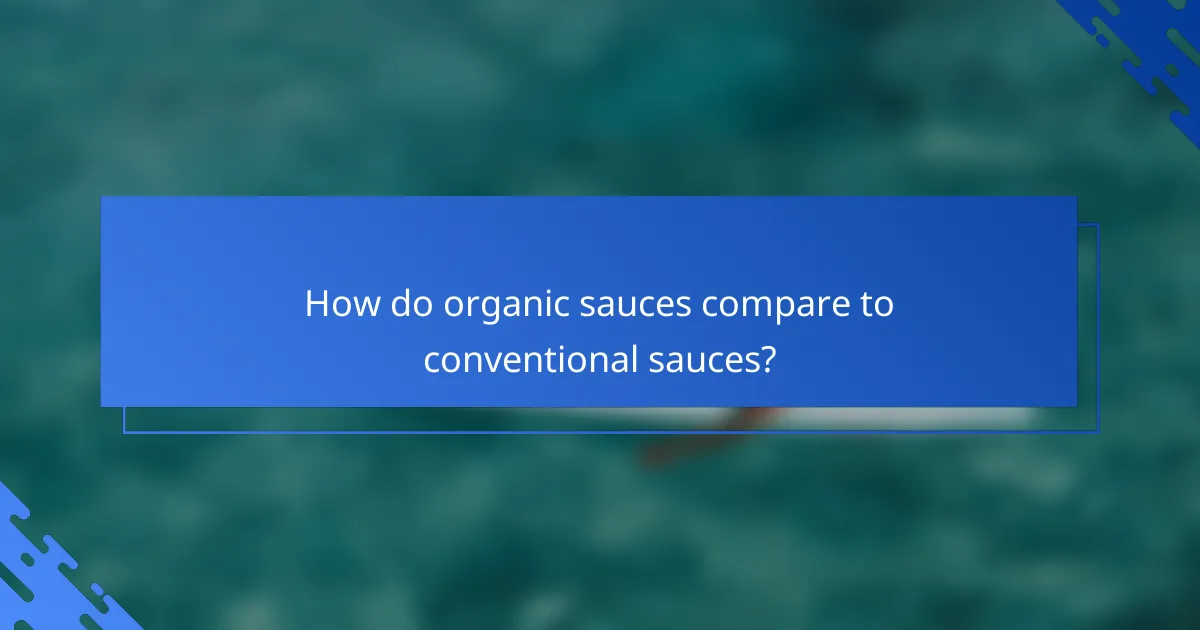
How do organic sauces compare to conventional sauces?
Organic sauces differ from conventional sauces primarily in their ingredient sourcing, processing methods, and packaging. Organic sauces are made from ingredients grown without synthetic pesticides or fertilizers, undergo minimal processing, and are often packaged in eco-friendly materials.
Health benefits
Organic sauces typically contain fewer additives and preservatives compared to conventional options, making them a healthier choice for consumers. They often retain more nutrients due to minimal processing, which can enhance their overall nutritional profile.
Additionally, organic ingredients are less likely to contain harmful chemicals, reducing the risk of exposure to substances that may negatively impact health. This is particularly important for individuals with sensitivities or those looking to maintain a clean diet.
Environmental impact
The production of organic sauces generally has a lower environmental footprint than conventional sauces. Organic farming practices promote biodiversity, improve soil health, and reduce pollution from synthetic chemicals. This sustainable approach helps protect ecosystems and supports local farmers.
Moreover, many organic sauces are packaged in recyclable or biodegradable materials, further minimizing waste. Choosing organic can contribute to a more sustainable food system and encourage environmentally friendly practices in agriculture.
Flavor profiles
Organic sauces often boast more robust and authentic flavors due to the use of high-quality, natural ingredients. The absence of artificial flavors and preservatives allows the true taste of the ingredients to shine through, providing a richer culinary experience.
Consumers may notice that organic sauces have a fresher taste, which can enhance the overall flavor of dishes. Experimenting with various organic sauces can lead to discovering unique flavor combinations that elevate meals.

What certifications should you look for in organic sauces?
When selecting organic sauces, look for certifications that ensure the product meets specific organic standards. Key certifications include USDA Organic, Non-GMO Project Verified, and Fair Trade, which indicate sustainable practices and ingredient integrity.
USDA Organic Certification
The USDA Organic certification guarantees that the ingredients in the sauce are grown without synthetic fertilizers, pesticides, or genetically modified organisms. To qualify, products must contain at least 95% organic ingredients, ensuring a high standard of quality.
When shopping, check for the USDA Organic seal on the label. This certification not only supports sustainable farming practices but also promotes biodiversity and soil health.
Non-GMO Project Verified
The Non-GMO Project Verified label indicates that the sauce has been tested and meets strict standards for avoiding genetically modified organisms. This certification is crucial for consumers who prioritize natural ingredients and want to avoid potential health risks associated with GMOs.
Look for this label if you are concerned about the impact of GMOs on health and the environment. Many organic sauces carry this certification, reinforcing their commitment to natural sourcing.
Fair Trade Certification
Fair Trade certification ensures that the ingredients in organic sauces are sourced from producers who receive fair compensation and work under safe conditions. This certification supports ethical practices and promotes sustainable livelihoods for farmers.
Choosing sauces with Fair Trade certification not only benefits the environment but also contributes to social equity. It is a great way to support small-scale farmers and their communities globally.

